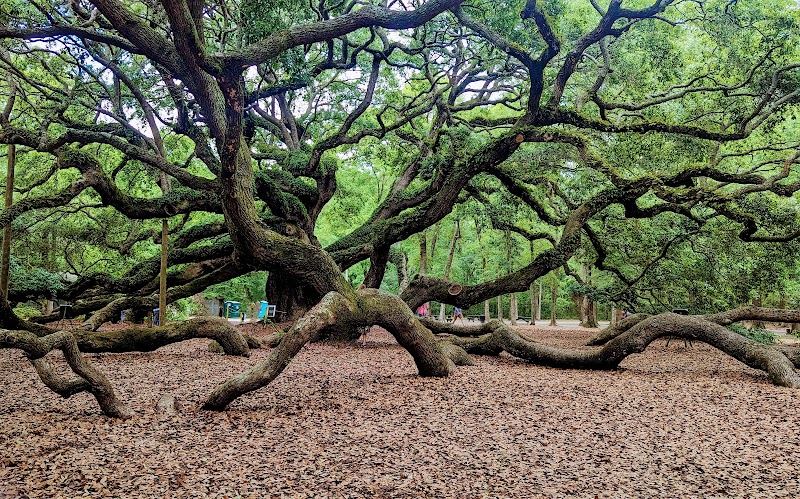
best camping near Charleston, South Carolina
Discover the best camping near Charleston, South Carolina, where coastal wilderness meets historic charm. Whether you prefer beachside solitude or forested campsites, this guide highlights practical tips and prime locations to make the most of your outdoor getaway.
Check Tide Schedules
Many coastal campsites are influenced by tides, affecting beach access and safety. Plan your activities around low tides for easier exploration and avoid high tides that can restrict movement.
Pack In, Pack Out
Leave no trace by bringing all your trash out of the campsites. These natural areas rely on visitor responsibility to remain pristine and enjoyable for everyone.
Bring Insect Repellent
Mosquitoes and other biting insects are common in coastal forests and marshes, especially in warmer months. Effective repellents will keep you comfortable at dawn, dusk, or after rain.
Use Durable, Waterproof Gear
Coastal weather can shift quickly; waterproof tents, packing covers, and quick-dry clothes help you stay dry and warm when sudden showers arise.
best camping near Charleston, South Carolina
Outdoor Escapes: Best Camping Near Charleston, South Carolina
If you’re looking for the best camping near Charleston, South Carolina, you’re in for an adventure where salt-kissed air meets moss-draped oaks and tidal marshes pulse with life. Just beyond Charleston’s historic charm and vibrant streets, a collection of campsites offers access to coastal forests, waterways, and islands that invite both novice campers and seasoned outdoorsmen to experience lowcountry wilderness firsthand.
Top Spots for Camping Around Charleston
Within a short drive, explore options like Cape Romain National Wildlife Refuge, Francis Marion National Forest, and various state parks where you can pitch your tent or park your camper. Cape Romain offers backcountry beach camping where the ocean challenges you with its relentless currents and the crashing surf dares the bravest to linger after sunset. Francis Marion’s dense pines and hardwoods provide shaded sites and a cooler retreat from summer's heat, complete with miles of trails for paddling and hiking.
These camps offer practical features such as potable water stations, fire rings, and easy trail access, which ease the logistics of setting up your base camp while keeping you close to the wild’s pulse. If you plan to camp here, remember that tides and weather hold sway, so timing your visit to low tide affords beachcombing opportunities and easier access to kayak launches.
Preparing for Your Trip
The ground beneath your feet feels alive, with the rustle of palmetto fronds and the distant calls of ospreys reminding you that nature here demands respect and preparation. Pack durable footwear for uneven terrain, waterproof gear for unpredictable coastal showers, and insect repellent to handle the local mosquito populations. Water sources can be limited in some backcountry areas, so bring sufficient hydration and purification methods.
Beyond Camping: Adventures Await
For further exploration, our web page presents an array of the best adventures in Charleston, South Carolina, from historic walking tours to kayaking scenic estuaries. Whether you aim to camp near the salt marshes or paddle through untouched creeks, Charleston’s outdoor experiences combine natural beauty with approachable challenge.
Camping near Charleston is more than a night under the stars; it’s a direct dialogue with a landscape fiercely itself, requiring practical preparation and a spirit ready for discovery.
Nearby Trips
All Adventures
Boat Charters
Water Activities
Adventures near Charleston, South Carolina
Discover the unique and memorable adventures that make Charleston, South Carolina special.
Frequently Asked Questions
Where are the best public campsites near Charleston?
Cape Romain National Wildlife Refuge and Francis Marion National Forest offer several public campsites with coastal access and forest cover, providing both beach camping and shaded spots within short distances of Charleston.
Do I need a permit to camp near Charleston?
Some areas, such as Cape Romain’s backcountry campsites, require permits to preserve the natural habitat and control impact. Be sure to check the official park websites for the latest permit information.
What wildlife might I see when camping near Charleston?
You can expect to encounter wading birds like herons and egrets, deer, raccoons, and occasionally otters along waterways. Keep a respectful distance and secure your food to prevent unwanted encounters.
What’s the best way to stay safe from tides while camping on the beach?
Camp above the high tide line and consult tide charts before setting up. Rising tides can quickly inundate low beach campsites, so awareness and timing are critical.
Is the water safe for swimming in coastal camping areas?
Swimming can be safe in designated areas, but always respect posted warnings about currents, tides, and local wildlife. Some sites may have strong currents or jellyfish, so remain vigilant.
What are the fire regulations for camping near Charleston?
Most sites allow campfires only in designated fire rings or pits. During dry periods, fire bans may be in effect to prevent wildfires. Always check local regulations before starting any fires.
Recommended Gear
Waterproof Tent
Protects from sudden coastal rains and keeps you dry and comfortable overnight.
Hydration System
Ensures you have access to clean water even when campsites lack potable sources.
Insect Repellent
Critical for comfort and preventing bites from mosquitoes and other insects.
Sturdy Hiking Boots
Offers support and protection for diverse and sometimes uneven coastal terrain.
Local Insights
Hidden Gems
- "A rarely visited overlook at Francis Marion offers serene views of the Wambaw Creek passage where herons nest."
- "At Cape Romain, Luna Landing provides a quiet shell-collecting spot away from larger crowds."
Wildlife
- "Keep an eye out for reddish egrets, a striking coastal bird that performs a hunting dance on tidal flats."
- "The elusive river otter is spotted along freshwater creeks, especially near dawn or dusk."
History
"The surrounding forests and marshes were once part of Gullah communities, whose cultural legacy permeates local traditions and stories."
